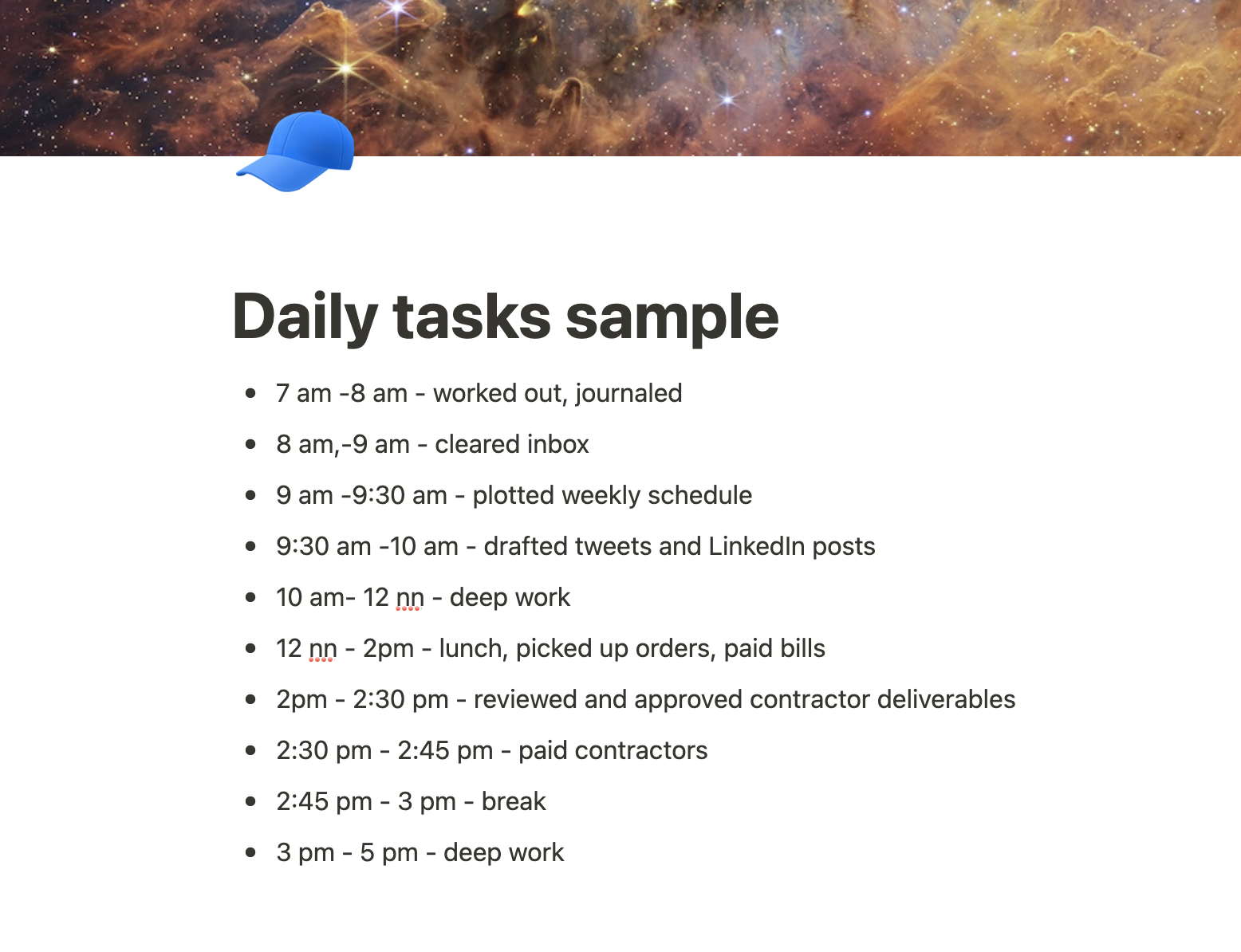Not knowing what to delegate can have major consequences. You could end up hiring the wrong person or waste time doing tasks that could've been done by someone else.
In this post, we'll help you identify what tasks to assign — and how to choose the right person for the job.
Let's jump right in:
Step 1: List down all the tasks that you do in a day

Knowing what to delegate begins with an audit of your tasks. This process helps you see where and how you spend your time. It's also a great way to check for timesucks or activities that don't contribute to your overall business growth.
How to do it
Get a notepad or open a document on your computer. List everything that you do throughout the day, from work-related tasks to personal chores. Take note of each task’s duration, too.
Make sure to track both unique and recurring tasks, as the latter are prime candidates for delegation. Doing this will also help you better match the right tasks to the right people and save time in the long run.
Do this for a week — or up to a month, if you like — to get a good grasp of what takes up most of your time.
Step 2: Review your tasks
Once the week is up, take your list and review:
- What tasks should be eliminated? These are tasks that are neither important nor urgent. Busy work like scrolling social media or going to long meetings without a clear agenda should be eliminated from your schedule altogether.
- What tasks can be automated? Automation tools can save you hours each week. Automate small, recurring tasks like social media scheduling, email flows, and invoice filing.
- What are the spedific tasks that only you can do? These are the tasks that need your specific attention or expertise. No one else in your organization can do them for you. Think of important tasks that involve top-level decision-making like hiring an operations manager or business development.
- What tasks should you delegate? Finally, we have the tasks that you can — and should — delegate. These tasks can't be eliminated or automated, but they don't require your specific expertise either. Examples include setting appointments, paying bills, overseeing day-to-day operations, or bookkeeping. You can take these tasks off your plate and delegate them to someone with the right skills, expertise, or training instead.
PRO TIP
Are there any tasks that you don't like doing or aren't particularly good at? This is a great opportunity for delegating tasks! Don't feel guilty about handing over work, you're freeing up your time to focus on your entire business.
Use the Eisenhower Matrix to help you decide

If you're still having a tough time sorting out your tasks, try using the Eisenhower Matrix. It's a time management tool that helps you prioritize tasks according to importance and urgency.
The Eisenhower matrix divides tasks into 4 quadrants:
- Q1: Important and urgent - these are critical assignments that you need to attend to immediately. Putting them off can lead to serious consequences for your business. Examples include “putting out fires”, crisis management, and meeting important deadlines.
- Q2: Important but not urgent - Quadrant 2 is all about "planting seeds" — you won't see immediate results after accomplishing these tasks, but they're essential for long-term growth. Q2 tasks don't have fixed deadlines, but doing them will set you up for the future. Carve out time for these tasks.
- Q3: Not important but urgent - These tasks need immediate attention, but they don't require your specific expertise. Delegate effectively or automate these.
- Q3: Neither important nor urgent - lastly, eliminate tasks that are neither important nor urgent.
Based on the Eisenhower Matrix, you should be doing Q1 tasks, while scheduling enough time for important but not urgent (Q2) tasks. Tasks under Q3 should be delegated or automated, while Q4 tasks should be taken off your plate completely.
Once you determine the tasks that you can delegate, it's time for step 3: finding the right person for assigning tasks and you can start delegating with confidence. This approach to delegating work helps ensure your time and energy go where they're needed the most.
Learn more: What tasks can you outsource to the Philippines?
Step 3: Hiring the best person for the job
What type of assistant do you need to hire based on the tasks that you want to delegate? Do you need a generalist or someone with a more specific skill set?
Here’s how to decide:
Review your delegable tasks and see if you can find a pattern. Are they mostly administrative, like data entry or file management? Do you need help accomplishing personal errands like scheduling a visit to the dentist or booking flights? Or maybe the tasks fall under a certain skill or theme like finance, design, or content creation?
For general business-related tasks, hire a virtual administrative assistant
They can help you complete a variety of small but time-consuming tasks for your business like:
- Data entry
- File management
- Customer service
- Creating slides
- Managing office budgets
With the right assistant, you can delegate responsibility for routine tasks and gain more time for higher-level priorities. Delegating work in this way improves efficiency without sacrificing quality.
For business-related and personal tasks, hire an executive assistant
Executive assistants can help you complete daily tasks like appointment setting and email management. Aside from work-related stuff, you can also delegate more personal tasks to an EA, like booking a flight, paying your bills, or ordering birthday gifts for family members.
Be sure to give clear instructions when assigning responsibilities, and provide feedback regularly to ensure everything stays on track.
If your assistant shows interest, you can also support them in learning new skills, which may help them take more responsibility over time.
Also, take team members' interests into account when assigning certain tasks as this can lead to better engagement and longer-term retention.
For skill-specific tasks, hire a specialist
See a skill pattern or theme in the tasks that you need to delegate? Hire someone with the right skill set. For example, if you see a lot of finance tasks, you might need to hire an accountant, or if you need lots of help with your Youtube channel, a video editor might make more sense versus hiring a general VA.
Use this opportunity to leverage your employees' strengths, as this way you're not only improving productivity but also building a capable and engaged team.
Related: 12 unique roles you didn’t think you could outsource to remote Filipino staff
Step 4: Decide if you need to hire them full-time or part-time

Now that you know what tasks to delegate and who to assign them to, the only thing left to do is to decide whether you need to hire a full-time assistant, a part-timer, or a freelancer.
Take a look at the frequency of the tasks and ask yourself:
- Is the workload consistent?
- Do you need someone to help you with long-term projects?
- Do you have the time to onboard and train your assistant?
- Are you looking for someone to fully take ownership of a certain role in your company?
- Are you willing and able to provide benefits?
If your answer is yes to any of these questions, hiring a full-time remote employee is your best bet.
On the other hand, if the workload varies from time to time, or you just need help with a few short-term projects, you might be better off hiring a part-timer or freelancer.
Maintaining open communication with your assistant is essential for long-term success, whether they're full-time or part-time. As they grow into their role, consider giving them more responsibility and opportunities to develop new skills.
Learn more: The benefits of hiring full-time staff
Set yourself up for delegation success
And there you have it: 4 easy steps to determine what tasks to hand off to a remote assistant!
We hope that this simple but effective process helps you zero in on the tasks that you need to delegate effectively, hire the best person for the job, and ultimately buy back your time.
Delegating tasks doesn't have to be complicated. With a clear system in place and the right help, assigning tasks and delegating work can lead to smoother operations, less stress, and more time to focus on growing your business.
Ready to start delegating and scaling your business? Sign up for our free course, The Delegation Leap. You'll get proven tips on how to:
- create effective SOPs
- integrate your assistant into your daily routine
- offload more complex tasks
- and set yourself up for delegation success








.webp)

.webp)



